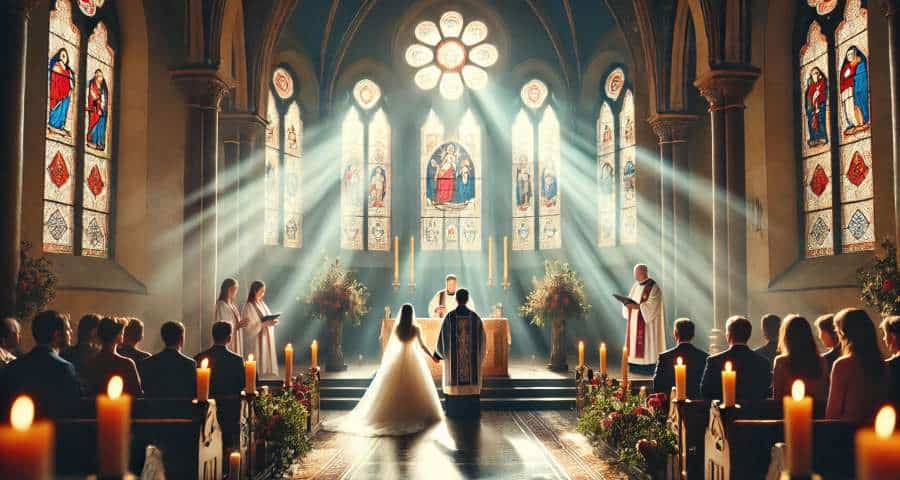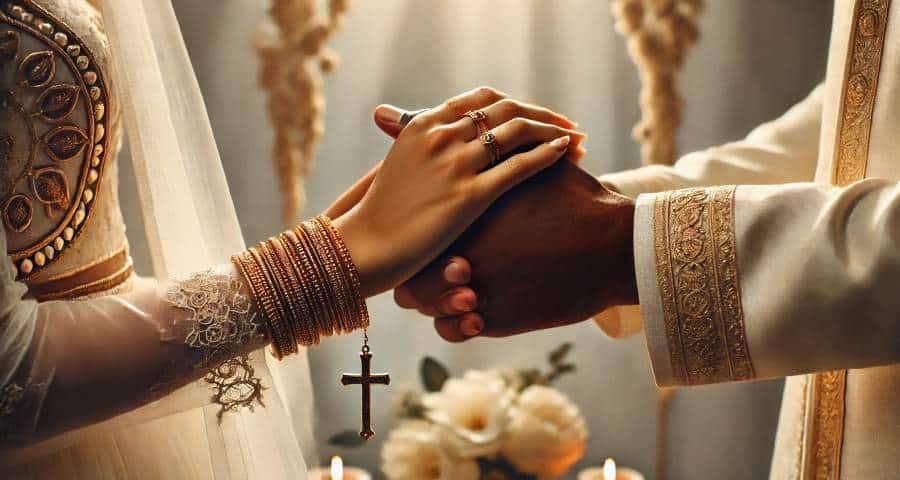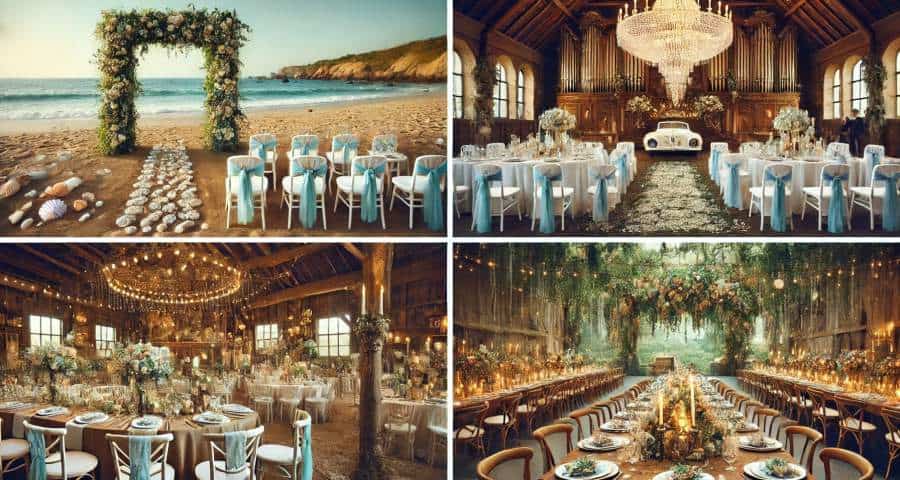Choosing a type of wedding ceremony often comes down to a mix of personal beliefs, cultural traditions, and individual preferences.
Each type of wedding serves different needs and reflects different values, making the choice highly personal and significant to each couple.
Religious Ceremonies

A religious wedding ceremony is characterised by rituals and readings that reflect the sacred beliefs and practices of a religion, symbolising a union under God and holding profound spiritual significance for the couple.
These ceremonies typically take place in a house of worship, such as a church, synagogue, mosque, or temple, and are presided over by a religious leader like a priest, rabbi, imam, or minister.
At the heart of a religious ceremony is the concept of marriage as a covenant, a solemn agreement between the couple and their deity, revered as a foundational element of their faith and new life together.
Key Elements of a Religious Ceremony:
- Venue: Typically held in a place of worship, the venue is often chosen based on the couple’s membership or familial ties to a particular congregation. Some faiths may allow or require ceremonies to be held outdoors or in other significant locations.
- Rituals: Specific rituals vary widely among different religions. For example, in Christian weddings, exchanging vows and rings, lighting a unity candle, and blessings are common. In Jewish ceremonies, couples may participate in the signing of the Ketubah (marriage contract), standing under a Chuppah (wedding canopy), and the groom may break a glass underfoot.
- Music and Readings: These are typically selected from religious texts or music approved by the religious community. They serve to underscore the spiritual foundation of the marriage and often include prayers, hymns, and religious passages.
- Dress Code: Attire can be influenced by religious norms, requiring modesty or specific garments, like a head covering or ceremonial robes. Guests are usually expected to adhere to these dress codes out of respect for the ceremony’s religious nature.
- Officiant: The officiant is usually a cleric or religious leader authorized by the faith community to perform wedding ceremonies. Their role is crucial as they guide the couple through their vows and the spiritual significance of marriage within the faith.
Considerations for Planning a Religious Ceremony:*
- Faith Requirements: Couples may need to complete religious education sessions or counselling with their officiant ahead of the wedding. Some faiths also require that both partners share the same religious beliefs.
- Legal Aspects: Ensure the ceremony meets both religious and legal requirements for marriage in your location. This often involves obtaining a marriage license and having the officiant recognized by the state to conduct the ceremony.
- Guest Considerations: Inform guests about any specific participation expected during the ceremony or adherence to religious customs, such as dress codes or moments of prayer.
- Personalization: While tradition guides religious ceremonies, many faiths allow couples to personalise aspects of the service, like music, readings, and vows, to reflect their personal beliefs and relationship.
Interfaith Ceremony

As our world becomes increasingly interconnected, interfaith marriages have become more common.
Couples from different religious backgrounds are choosing to blend their traditions in a single ceremony, a beautiful testament to their respect for each other’s beliefs and heritage.
An interfaith wedding ceremony, while challenging to plan, offers a unique opportunity to celebrate the diversity of faith and the unity it can foster.
An interfaith ceremony merges elements from two or more different religious traditions.
It’s designed to reflect the beliefs and practices of both partners equally, often requiring a delicate balance to ensure that neither family feels their traditions are being overshadowed.
This type of ceremony can be held in a neutral location or in a place that holds significance to both religions, like a non-denominational chapel or a beautiful outdoor setting.
Planning an Interfaith Ceremony:
- Communication is Key: Before anything else, it’s crucial for the couple to discuss their visions and boundaries regarding their wedding ceremony. Understanding what is non-negotiable for each partner in terms of religious practices can help in forming a ceremony that feels inclusive and respectful.
- Finding the Right Officiant(s): Often, couples choose to have two officiants, each representing a different faith, to co-officiate the ceremony. This ensures that the religious elements of each faith are handled correctly and with respect. Finding officiants who are willing to participate in an interfaith ceremony and collaborate with each other is essential.
- Customising Rituals and Readings: Selecting rituals and readings from each religion that complement each other and do not conflict with the core beliefs of either faith is a creative challenge. For example, a couple might choose to blend the lighting of a unity candle (a Christian tradition) with the seven blessings (a Jewish tradition).
- Inclusive Ceremony Program: Creating a ceremony program that explains the significance of each ritual can be very enlightening for guests who may not be familiar with one or both religions. This not only educates but also makes everyone feel included in the proceedings.
- Respecting Traditions While Embracing Flexibility: Some religious traditions might not easily blend together in a ceremony. In these cases, it’s important to maintain a flexible attitude, possibly celebrating certain aspects of each religion separately within the ceremony or the reception. The key is to honour the essence of both faiths without diluting their meaning.
- Venue Considerations: Choosing a venue that is neutral, where no specific religious symbols dominate, can make both sides of the family comfortable. Alternatively, decorating the venue in a way that beautifully integrates symbols from both religions can also be a meaningful gesture.
Common Challenges and Solutions:
- Family Expectations: Families might have strong feelings about religious traditions. Early and open discussions about the ceremony’s structure can help manage expectations and reduce potential conflicts.
- Cultural Sensitivity: Understanding the deep-rooted significance of certain religious rituals is crucial. Couples should educate themselves about each other’s religious customs thoroughly to ensure they approach them with sensitivity and respect.
Civil Ceremonies

Civil ceremonies present a straightforward and elegant alternative to religious or elaborate wedding celebrations.
This type of ceremony is legally recognized and typically conducted by a government official such as a judge, justice of the peace, or a city clerk.
The primary focus is on the legal aspects of marriage, ensuring the couple meets the state’s requirements for a valid marriage contract.
Conducted without religious connotations, civil ceremonies are universally appropriate for couples from different faiths or those who prefer a secular approach to marriage.
Key Elements of a Civil Ceremony
- Venue: Often held in a city hall, courthouse, or other government buildings, civil ceremonies can also take place in various approved locations such as parks, homes, or even on the beach, depending on local laws and regulations.
- Officiant: The ceremony is officiated by a government official who has the legal authority to conduct marriage ceremonies. This official might be a judge, magistrate, or a city or county clerk.
- Ceremony Content: Civil ceremonies are typically brief, lasting about 15-20 minutes. The content usually includes a welcome speech, the exchange of vows, the exchange of rings (if the couple chooses), and the pronouncement of marriage. The officiant might also include a short message about marriage or partnership.
- Witnesses: Most jurisdictions require at least one or two witnesses to be present during the ceremony for the marriage to be legally binding.
- Personalization: While civil ceremonies are straightforward, couples can personalise their experience by writing their own vows, choosing special readings, or incorporating music that holds personal significance.
Planning Your Civil Ceremony
- Booking the Venue: Determine where you’d like to hold your ceremony and book the venue accordingly. Popular city halls or public spaces can have long waiting lists, so it’s wise to plan ahead.
- Legal Requirements: Check with your local jurisdiction to understand all legal necessities such as marriage licences, witness requirements, and any residency requirements.
- Consider a Reception: Just because the ceremony might be low-key doesn’t mean the celebration has to be. Many couples choose to host a reception after their civil ceremony to celebrate with friends and family.
- Photography: Even if the ceremony is brief, hiring a photographer to capture the moment can provide lasting memories of your special day.
Benefits of Choosing a Civil Ceremony
- Simplicity: For couples looking for a straightforward way to get married without the fuss of a large wedding, civil ceremonies are an excellent option.
- Cost-Effective: Generally, civil ceremonies are less expensive than traditional weddings, which can include costly elements like venues, floral arrangements, and large receptions.
- Flexibility: Civil ceremonies offer the flexibility to get married relatively quickly and at various times of the week, which is particularly appealing for those with busy schedules or those organizing a last-minute wedding.
Spiritual/Humanist Ceremony:

Spiritual/humanist ceremonies are characterised by their lack of affiliation with any formal religion.
Instead, these ceremonies embrace a broader spectrum of spirituality or human-centred values, focusing on the essence of human love and commitment.
They are often officiated by non-denominational ministers or celebrants who specialise in crafting a ceremony that reflects the couple’s personal beliefs and life philosophies.
Key Elements of a Spiritual/Humanist Ceremony
- Officiant: Unlike traditional religious ceremonies, a spiritual or humanist wedding may be led by a variety of officiants. Certified celebrants, non-denominational ministers, or even a friend or family member who has obtained a legal officiant status can perform the ceremony.
- Venue: There are no restrictions on where a spiritual/humanist ceremony can take place. You have the ability to have the ceremony at unique venues like parks, beaches, historic sites etc since they aren’t bound to religious institutions. The venue often reflects the couple’s personal taste and the meaning they wish to imbue in their day.
- Ceremony Content: This is where personalization really comes to life. The ceremony might include readings from literature, poetry, philosophical texts, or personal vows written by the couple. Elements like a sand ceremony, handfasting, or a candle lighting can also be incorporated to symbolise the joining of lives.
- Music and Readings: The selection of music and readings is deeply personal, often chosen to reflect the spiritual and emotional journey of the couple. These elements can vary from traditional wedding music to more unconventional choices that have special significance to the couple.
- Cultural or Spiritual Elements: While not adhering to a specific religion, these ceremonies often integrate aspects of the couple’s cultural heritage or personal spirituality. This might include traditional rituals, attire, or symbols that have meaningful spiritual connotations for the couple.
Planning Your Spiritual/Humanist Ceremony
- Finding the Right Officiant: Start by selecting an officiant who is open to and experienced in conducting non-traditional ceremonies. They should be willing to collaborate closely with you to incorporate your values and beliefs.
- Crafting the Ceremony: Work with your officiant to develop a ceremony that reflects both partners’ beliefs and personalities. This collaboration is key to creating a meaningful experience.
- Legal Considerations: Ensure that the ceremony meets legal marriage requirements in your jurisdiction. This may influence who you can choose as an officiant and what needs to be included in the ceremony script.
- Guest Involvement: Consider involving guests in the ceremony through interactive rituals or by inviting them to share readings or personal messages. This can enhance the communal feel of the ceremony.
Benefits of Choosing a Spiritual/Humanist Ceremony
- Personalization: These ceremonies offer maximum flexibility, allowing the couple to express their love and commitment in ways that are most meaningful to them.
- Inclusivity: By not being tied to a specific religion, these ceremonies are inclusive of all beliefs, which is particularly beneficial for couples from diverse backgrounds or with a broad spectrum of beliefs among their families and friends.
- Reflection of Values: A spiritual/humanist ceremony can deeply reflect a couple’s values, beliefs, and personalities, making the ceremony extraordinarily personal and memorable.
Renewal of Vows and Commitment Ceremonies

As relationships grow and evolve, many couples choose to reaffirm their commitment to each other through renewal of vows or commitment ceremonies.
These events are meaningful ways to celebrate love, commemorate anniversaries, or simply declare ongoing devotion in the presence of loved ones.
Unlike traditional wedding ceremonies, these events are not legally binding, they are purely ceremonial, making them highly customizable and deeply personal.
- Renewal of Vows: Typically held after a significant milestone in a marriage, such as a 10th, 25th, or 50th anniversary, vow renewals allow couples to reaffirm the promises they made to each other on their wedding day. This ceremony can be a poignant reminder of their journey together and a renewal of their future intentions.
- Commitment Ceremonies: Often used by couples who wish to celebrate their partnership without the legal formalities of marriage, commitment ceremonies are a popular choice among those who cannot or choose not to legally marry. These ceremonies are a beautiful way to express devotion and are equally significant in celebrating a union.
Key Elements of These Ceremonies
- Venue: From a backyard garden to the location where you first met, or even a grand hall, the choice of venue is about personal significance more than convention. Some couples return to their original wedding venue for vow renewals to relive their wedding day.
- Officiant: While anyone can officiate these ceremonies since they carry no legal weight, many couples choose someone significant to their relationship, such as a close friend, family member, or even the original wedding officiant if it’s a vow renewal.
- Ceremony Content: Much like a wedding, these ceremonies might include readings, music, and the exchange of new rings or gifts. However, the vows are the centrepiece, personalised to reflect the couple’s experiences, growth, and continued commitments.
- Participants: These ceremonies can be intimate, with just the couple and a few witnesses, or larger celebrations involving family and friends. Children of the couple, if any, often play special roles.
Planning Your Ceremony
- Decide on the Scale: Determine whether you want a large celebration or a more intimate gathering. This decision will guide your planning, from the choice of venue to the guest list.
- Personalise Your Vows: Reflect on your relationship’s journey and incorporate these elements into your vows. Consider the challenges you’ve overcome and the joys you’ve shared, and express your hopes for the future.
- Incorporate Symbols: Just as with a wedding, you might choose symbols that have become significant to your relationship over time. This could include a unity candle, a sand ceremony, or a handfasting.
- Celebrate Your Way: There are no rules. Some couples opt for a casual get-together, while others plan elaborate parties. The style and theme of the ceremony can reflect your tastes and personality as a couple.
Benefits of Renewing Vows or Holding a Commitment Ceremony
- Reaffirmation of Love: These ceremonies serve as a public reaffirmation of a couple’s love and commitment, reinforcing the strength of their bond.
- Family Involvement: They offer a wonderful opportunity to involve children and other family members, helping to strengthen the family unit and celebrate its growth.
- Flexibility and Personalization: Without the constraints of legal formalities, these ceremonies can be tailored in countless ways, reflecting the couple’s unique relationship and lifestyle.
Destination Wedding Ceremony:

A destination wedding is the ultimate way to say “I do.” Combining the allure of travel with the beauty of a personalised ceremony, these weddings take place in stunning locations far from the couple’s hometown, be it a sun-drenched beach, an elegant European castle, or a serene mountain retreat.
Why Choose a Destination Wedding?
- Unforgettable Scenery: Destination weddings often feature breathtaking backdrops that enhance the ceremony’s beauty and create spectacular photo opportunities. Whether it’s the rolling vineyards of Tuscany, the crystal-clear waters of the Caribbean, or the rugged landscapes of New Zealand, the setting itself becomes a key element of the wedding.
- Intimate Gathering: These weddings typically involve a smaller guest list, which can help create a more intimate and meaningful celebration with your closest friends and family.
- Extended Celebrations: Unlike traditional weddings, which might last a single day, destination weddings can span several days, offering multiple opportunities to bond with guests through organized activities and shared experiences.
Planning Your Destination Wedding
- Choosing the Right Location: The first step in planning a destination wedding is selecting a location that suits your style and meets your logistical needs. Consider factors like travel accessibility, local attractions, and the overall vibe of the place.
- Visit in Advance: If possible, visit the location beforehand to scout venues, meet vendors, and get a feel for the area. This trip can be crucial for making informed decisions about your wedding details.
- Hire a Local Wedding Planner: A local planner can be invaluable, offering insider knowledge of the best suppliers, venues, and local practices. They can handle the details that are more challenging to manage from afar, ensuring everything runs smoothly.
- Understand the Legal Requirements: Different countries and regions have varying legal requirements for marriage. Ensure you understand and can fulfil these requirements to avoid any issues on your big day.
- Communicate Clearly with Guests: Provide guests with all the necessary information, including travel tips, accommodation options, and a detailed itinerary. Consider creating a wedding website to centralise all this information.
- Plan Group Activities: To make the most of the destination, organise activities like group dinners, tours, or relaxation sessions at a local spa. These shared experiences can make the event even more memorable for everyone involved.
Considerations for a Destination Wedding
- Budget: Destination weddings can be expensive due to travel costs, accommodations, and the logistics of bringing vendors or décor from home. Consider this in your budget planning.
- Guest List: The travel required for a destination wedding may limit who can attend. Be prepared for key people possibly being unable to make it due to travel costs or time constraints.
- Weather and Timing: Research the best times to visit your chosen destination, considering factors like weather, tourist seasons, and local holidays, which could affect your wedding’s atmosphere and pricing.
Elopements/Minimony:

Elopements and minimonies offer an intimate alternative to traditional ceremonies.
These types of events focus on the couple and their unique love story, often set against a backdrop that holds special significance to them.
Whether it’s a spontaneous decision to elope or a carefully planned minimony, these ceremonies provide a personal, meaningful way to celebrate commitment without the complexity and expense of a larger wedding.
Understanding Elopements and Minimonies
- Elopements: Traditionally, eloping has meant secretly running away to get married. However, today’s elopements have evolved to represent a planned and personalised wedding experience that involves only the couple. Elopements strip down the wedding to the essentials, focusing solely on the couple’s union and often taking place in a unique or significant location.
- Minimonies: A term coined more recently, a minimony is a mini ceremony. It includes a few close loved ones, typically no more than 10 guests and maintains the intimacy of an elopement while incorporating elements of a traditional wedding on a smaller scale.
Minimonies are often followed by a larger celebration at a later date, allowing the couple to honor their initial commitment with a broader circle of friends and family when circumstances permit.
Why Choose an Elopement or Minimony?
- Personalization: With fewer guests and less formal structure, couples can truly personalise every aspect of their ceremony, from the location to the vows and the overall pace of the day.
- Cost-Effective: Reducing the scale of the ceremony can significantly decrease wedding expenses, freeing up resources for other priorities, such as a dream honeymoon or a future home.
- Focus on the Couple: Elopements and minimonies allow the couple to focus entirely on each other, creating a truly intimate and memorable experience without the distractions of a larger event.
- Flexibility: These ceremonies offer flexibility in timing and planning. Couples can decide to marry on a significant date for them, perhaps the anniversary of when they first met, and they can organize their wedding with relatively short notice.
Planning Your Elopement or Minimony
- Choosing the Right Location: Select a location that is meaningful or breathtakingly beautiful. This could be the place where you had your first date, a favorite vacation spot, or even a scenic outdoor setting.
- Involving Loved Ones: Decide if you want it to be just the two of you or if you will include a few close family members or friends. If keeping it private, consider how you will share the news and celebrate with others later.
- Hiring the Right Vendors: Even for small ceremonies, professional vendors like photographers, florists, and officiants can enhance your experience. Choose vendors who are comfortable with and experienced in smaller, more personalized weddings.
- Legal Requirements: Ensure you understand and fulfill the legal requirements for marriage in your chosen location, including licenses and any necessary witnesses.
- Post-Ceremony Celebration: Plan how you’ll celebrate after the ceremony. This could be a romantic dinner, a casual gathering at a local restaurant, or a future large party with extended family and friends.
Making the Most of Your Elopement or Minimony
To truly embrace the beauty of an elopement or minimony, consider what marriage means to you as a couple and let those values guide your planning. Whether it’s sharing heartfelt vows on a mountaintop or exchanging rings in your backyard, these ceremonies can be as unique as your love story. Remember, the day is about you and your partner’s commitment to each other, so make choices that bring joy and meaning to both of you.
Elopements and minimonies challenge traditional wedding norms, offering a celebration focused on personal significance and intimate connection. By choosing this style of ceremony, couples can experience a profoundly meaningful start to their married life together, setting a tone of intention and celebration that is uniquely their own.
Themed Weddings

Themed weddings allow couples to express their personalities and interests in a fun, creative, and memorable way.
Whether you dream of a serene beach affair, a magical fairytale event, or a nostalgic vintage celebration, incorporating a theme can transform your wedding day into a truly personal showcase of your love story.
Popular Wedding Themes
- Beach Theme: Ideal for lovers of the sea and sand, a beach-themed wedding often features a relaxed vibe with elements like seashells, driftwood, and ocean-inspired colors. These weddings typically take place by the seaside but can be simulated in inland venues with the right decor.
- Fairytale Theme: For those who grew up dreaming of a storybook romance, a fairytale-themed wedding might include elements like enchanted forest decor, whimsical florals, and dramatic, romantic touches. Think Cinderella’s carriage or a ballroom decorated like a royal court.
- Vintage Theme: A vintage-themed wedding can transport guests to another era, featuring antique-style decor, classic cars, and attire that reflects a bygone period, such as the roaring ’20s or the elegant ’50s. This theme can add a touch of elegance and nostalgia to your special day.
- Rustic Theme: Perfect for couples who appreciate the charm of nature and simplicity, rustic weddings often take place in barns or outdoor settings and feature natural textures like wood, burlap, and lace. Mason jars, handmade signs, and wildflowers are common fixtures in rustic-themed weddings.
- Modern Theme: For those who prefer a sleek, contemporary look, modern-themed weddings might showcase minimalist design, geometric shapes, and a monochrome color palette. Venues like art galleries or urban lofts typically complement this theme well.
Integrating Your Theme into the Wedding Ceremony
- Venue Selection: Choose a venue that naturally complements your theme. For example, a castle or historic mansion could be perfect for a fairytale wedding, while a chic rooftop would suit a modern theme.
- Decor and Styling: Use decor to fully embrace your theme. This includes table settings, floral arrangements, and other decorations that match your thematic choice. Consistency in decor helps to immerse your guests in the theme from the moment they arrive.
- Attire: Encourage attire that aligns with your theme. You might opt for a vintage lace dress for a vintage-themed wedding or flowing, airy fabrics for a beach wedding. You can also suggest dress codes to guests to further enhance the thematic experience.
- Invitations and Stationery: Set the tone early with invitations that reflect your wedding theme. This can be a subtle nod through color and design or more overt thematic elements like art deco borders for a vintage theme.
- Food and Beverage: Tailor your menu and drink options to match the theme. A beach-themed wedding might feature seafood and tropical cocktails, while a fairytale wedding could offer more elaborate, royal-inspired cuisine.
- Entertainment and Music: Select music and entertainment that enhance the atmosphere. For instance, a jazz band for a vintage wedding or a string quartet for a fairytale theme can significantly augment the thematic feel.
Tips for Themed Weddings
- Balance Is Key: While it’s exciting to dive into a theme, balance is crucial. Ensure the theme enhances the experience without overwhelming the essence of the wedding—the celebration of your love and commitment.
- Personalize: Use your theme to tell your story. Include personal touches that speak to your personalities and relationship. This could be through custom decor pieces, a unique twist on traditional rituals, or incorporating hobbies and interests you share as a couple.
- Consider Your Guests: While your wedding day is about you, consider the comfort and enjoyment of your guests. Make sure the theme is accessible and enjoyable for everyone attending.
Cultural Wedding Traditions

Weddings are not just celebrations of love but also deeply rooted cultural events that reflect the traditions and values of the families involved.
Across the globe, diverse cultural wedding traditions add richness and significance to the nuptial festivities.
Handfasting – A Celtic Tradition
- Origin and Significance: Handfasting is an ancient Celtic tradition that has enjoyed a resurgence in modern weddings, especially among those who appreciate historical or pagan traditions. Originally, handfasting was a form of engagement or temporary marriage, but today, it symbolizes a binding commitment between the couple.
- How It’s Performed: During the ceremony, the couple’s hands are tied together with a cord or ribbon as they recite their vows, symbolizing their union. The knots tied are meant to represent the couple’s intentions to stay together and support each other.
- Modern Adaptations: While traditionally part of Celtic ceremonies, handfasting has been adapted by couples around the world to add a personalized and visually symbolic touch to their wedding ceremony.
Tea Ceremony – A Cherished Asian Tradition
- Cultural Roots: Predominantly found in Chinese and Japanese cultures, the tea ceremony is a revered tradition that honors respect and gratitude. It’s a significant part of weddings where couples pay homage to their parents and elder relatives.
- How It’s Performed: In a typical tea ceremony, the couple serves tea to their parents and sometimes to other members of the family, as a gesture of respect and gratitude. Each person receives the cup of tea and, in return, offers their blessings to the couple.
- Modern Adaptations: Modern couples often incorporate the tea ceremony into their wedding day as a standalone event or before the main reception to maintain cultural ties and honor their heritage in a more intimate setting.
Other Cultural Wedding Traditions
- The Henna Ceremony: Common in Indian and Middle Eastern cultures, the henna ceremony involves applying intricately designed henna paste to the bride’s hands and feet as a form of blessing. This ceremony is often accompanied by singing, dancing, and feasting.
- Money Dance: In many cultures, including Polish, Greek, and Filipino weddings, the money dance allows guests to pin money onto the bride’s dress or groom’s suit as a way to shower the couple with prosperity and good fortune.
- Breaking the Glass: In Jewish weddings, the ceremony often concludes with the groom breaking a glass underfoot, symbolizing the destruction of the Temple in Jerusalem and reminding everyone of the fragility of human relationships.
- Jumping the Broom: This tradition, common in African American weddings, has its roots in the slave period of the United States when slaves couldn’t legally marry. Jumping over a broom together was adopted as a public declaration of the couple’s commitment to each other.
Incorporating cultural traditions into a wedding ceremony not only honors heritage but also creates a deeper sense of community and belonging among families and guests. For couples from different cultural backgrounds, blending traditions can be a beautiful way to symbolize the union of their distinct histories and shared future.
Couples planning their weddings might consider including cultural elements that resonate with their personal stories or family histories. Whether it’s a traditional garment, a particular ritual, or a unique celebration style, these elements add authenticity and personal significance to the wedding day.
Cultural wedding traditions enrich the ceremony and reception, making each wedding uniquely memorable. They remind us that at the heart of these celebrations is not only the love between the couple but also their connection to the past and commitment to the future.

